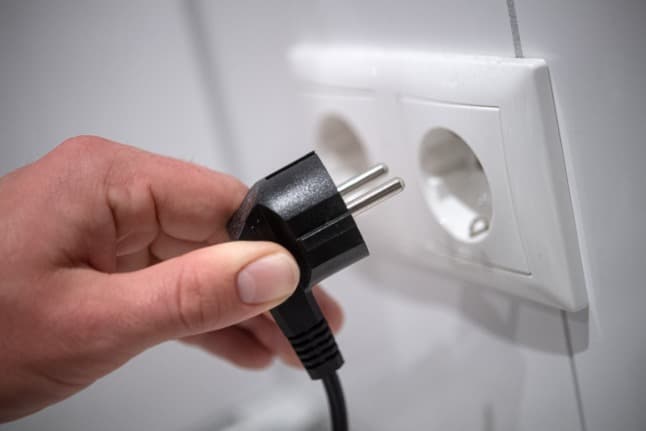German consumers 'pay the highest electricity prices in Europe'

For the second year in a row, consumers in Germany have paid the most for electricity in a Europe-wide comparison, according to a new report.
After the Bundesrepublik took the Europe-wide lead from Denmark in 2019 for the highest electricity prices, the costs have increased again in 2020, as shown in new figures from the Federal Statistical Office published on Monday.
Prices also rose for larger households with an annual consumption of 3,500 kilowatt hours: They reportedly paid an average of 30.43 cents per kilowatt-hour, up from 29.83 cents a year earlier.
According to the Federal Statistical Office, average electricity prices in Europe fell last year: in the euro area they dropped 0.53 cents to 22.47 cents per kilowatt hour.
And in the 27 countries of the European Union they went down by 0.51 cents to 21.26 cents.
READ ALSO: Electricity bills in Germany - how to keep your costs down
‘Unacceptably high prices'
"Germany is the 'European champion' when it comes to electricity prices. They are unacceptably high and must fall significantly," Dietmar Bartsch, chairman of the Left Party (Die Linke) in the Bundestag, told the Funke newspapers group.
He called on the electricity tax to be abolished for private households and the “EEG levy” to be fundamentally reformed.
"Electricity and energy must not become a luxury good,” said Bartsch.
The EEG levy, which pays a guaranteed price for renewable energy to producers, is a major component of electricity bills around Germany.
To prevent the levy, part of the country’s Renewable Energy Sources Act (EEG), from rising dramatically, the German government had stabilised it with billions worth of taxpayers’ money for the years 2021 and 2022.
As a result, the levy will amount to 6.5 cents per kilowatt hour in 2021 and six cents in 2022.
First enacted in 2000, and modified several times, the EEG has been credited with rapidly boosted Germany's production of wind and solar energy.
It's also helped foster the growth of the hydroelectricity and geothermal sectors, as Germany seeks to meet long-term climate protection goals.
READ ALSO: Is Germany the green leader it's hyped up to be?
Vocabulary
electricity consumption - (der) Stromverbrauch
euro area - (der) Euroraum
fundamentally - grundlegend
surcharge - (der) Aufschlag
We’re aiming to help our readers improve their German by translating vocabulary from some of our news stories. Did you find this article useful? Let us know.
Comments
See Also
After the Bundesrepublik took the Europe-wide lead from Denmark in 2019 for the highest electricity prices, the costs have increased again in 2020, as shown in new figures from the Federal Statistical Office published on Monday.
Prices also rose for larger households with an annual consumption of 3,500 kilowatt hours: They reportedly paid an average of 30.43 cents per kilowatt-hour, up from 29.83 cents a year earlier.
According to the Federal Statistical Office, average electricity prices in Europe fell last year: in the euro area they dropped 0.53 cents to 22.47 cents per kilowatt hour.
And in the 27 countries of the European Union they went down by 0.51 cents to 21.26 cents.
READ ALSO: Electricity bills in Germany - how to keep your costs down
‘Unacceptably high prices'
"Germany is the 'European champion' when it comes to electricity prices. They are unacceptably high and must fall significantly," Dietmar Bartsch, chairman of the Left Party (Die Linke) in the Bundestag, told the Funke newspapers group.
He called on the electricity tax to be abolished for private households and the “EEG levy” to be fundamentally reformed.
"Electricity and energy must not become a luxury good,” said Bartsch.
The EEG levy, which pays a guaranteed price for renewable energy to producers, is a major component of electricity bills around Germany.
To prevent the levy, part of the country’s Renewable Energy Sources Act (EEG), from rising dramatically, the German government had stabilised it with billions worth of taxpayers’ money for the years 2021 and 2022.
As a result, the levy will amount to 6.5 cents per kilowatt hour in 2021 and six cents in 2022.
First enacted in 2000, and modified several times, the EEG has been credited with rapidly boosted Germany's production of wind and solar energy.
It's also helped foster the growth of the hydroelectricity and geothermal sectors, as Germany seeks to meet long-term climate protection goals.
READ ALSO: Is Germany the green leader it's hyped up to be?
Vocabulary
electricity consumption - (der) Stromverbrauch
euro area - (der) Euroraum
fundamentally - grundlegend
surcharge - (der) Aufschlag
We’re aiming to help our readers improve their German by translating vocabulary from some of our news stories. Did you find this article useful? Let us know.
Join the conversation in our comments section below. Share your own views and experience and if you have a question or suggestion for our journalists then email us at [email protected].
Please keep comments civil, constructive and on topic – and make sure to read our terms of use before getting involved.
Please log in here to leave a comment.